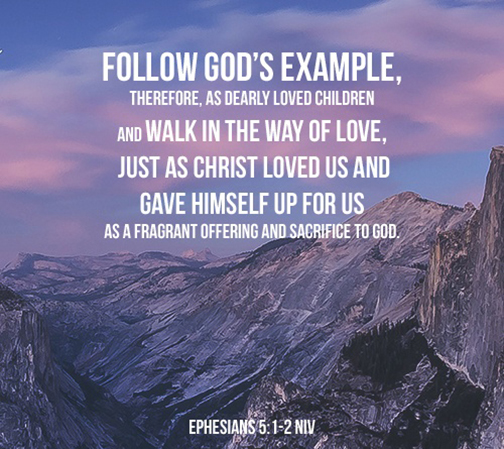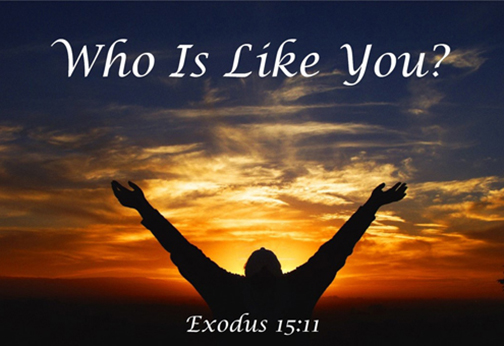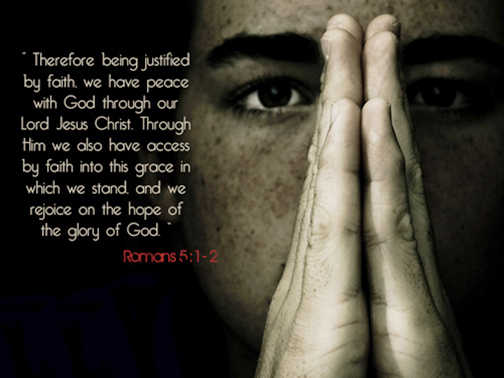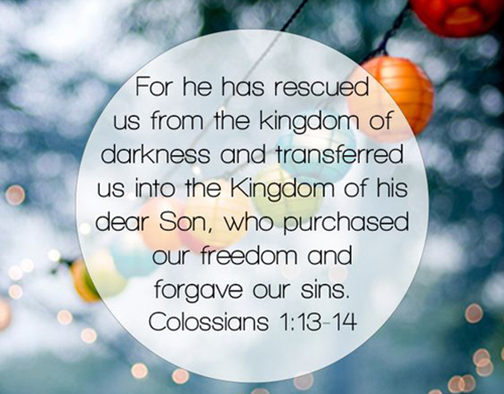“Self,” “Personality,” “Behavior,” and “Sanctification”
What we’ve been talking about the last few weeks in our class discussions is best described as “Self”—who we are at the very core of our being. It is my belief that “Self” comes first and foremost from God, in that He has pre-wired us with certain characteristics, so that we can fulfill the purpose He has for us as human beings. At the root level, part of bearing the “Image of God” is bearing that pre-wiring.
Secondly, “Self” also derives from the experiences we have had all throughout our lives: experiences that have influenced our development, first as children, and later as adults. These experiences do not, and cannot, change the pre-wiring God has given us. But, they do affect the way we express ourselves to the world. Because these experiences involve “Learning,” the outward expression of our innermost being (what we call our “Personality”) is shaped by these many, many events in our lives.
Even so, “Self” is very different from “Personality.” “Personality” is the outward expression of “Self”—the way we present our “Self” to the world. While we cannot control “Self,” because it comes from the pre-wiring that God has given us, we can, and often do, control the outward expression of our “Self” to the world—that is, to some extent, we can control our “Personality.” That’s why we present ourselves in slightly different ways to different people. Some may see our “Personality” in a context that is altogether annoying or irritating to them. Others may see our “Personality” as charming and endearing.
When the Holy Spirit reveals to us that we are sinners in need of a Savior, and when the Holy Spirit reveals to us what Christ has done on our behalf to pay the penalty for our sins, we come to understand that before the foundation of the earth God has extended His mercy, grace, and love to us as one of His precious “chosen ones.” That revelation to us from the Holy Spirit opens a new channel of communication with God. The change that takes place in us because of this redeeming work of Christ, and revealed to us by the Holy Spirit, is solely within the human being. We have done nothing to deserve this. It is God who has redeemed us through the birth, life, suffering, death, resurrection, and ascension of His one-and-only precious Son, Jesus. We, as ones chosen by God through His mercy, grace, and love, have become drawn into an exciting and new fellowship with God, solely because of who He is and because of what He has done for us.
Because we “chosen ones” now have learned about and acknowledged this relationship with God, we can next begin to “Learn” how to listen to the promptings of the Holy Spirit—listen, not in the sense of necessarily hearing a spoken voice, but rather having a sense inside oneself of a direction and pathway. The Holy Spirit often impresses on us what He wants us to know or to do. He prompts us or nudges us in a particular direction.
When we speak of “Sanctification,” we are talking about a process of becoming more and more like Jesus—actually, a process of becoming more holy. However, the process of sanctification does not change “Self” because the longer a person lives the more fixed “Self” becomes—the pre-wiring by God never changes and the wealth of unique life experiences begins to become less and less frequent with age—simply because we begin to experience similar situations over again, instead of having completely new experiences as we did when we were younger and growing older and, hopefully, more mature. So, the process of sanctification does not change “Self,” rather, the process of sanctification changes our “Behavior.”
Our “Behavior” is neither “Self” nor “Personality.” “Behavior” is driven by “Self” and becomes an outward expression of our “Personality.” But, “Behavior” is far more under the control of the human, and is a combination of learned responses to particular types of stimuli (events, words, phrases, situations, etc.) and behavioral drivers that come from the selfish and self-centered, even narcissistic, “Will” of the human.
The sin nature that began with Adam and flows to us through our parents, manifests itself in humans principally through the “Will.” The process of sanctification helps the chosen one learn to bend his or her selfish human “Will” to the divine and perfect will of God. The more that he or she surrenders his or her human “Will” to God’s perfect will, the more and more he or she will think and act like Jesus. Said another way, his or her “Behavior” will become more godly, that is, more holy.
So, when I say that I have a problem with undisciplined anger, I already know that such anger is wrong. The image of God within me tells me that undisciplined anger is wrong. Now, if I had not been chosen by God to belong to Himself, or if the Holy Spirit has not yet revealed God’s plan of choosing to me, I may have developed a pattern of “Behavior” that suppresses the Image of God within me that is telling me anger is wrong. In other words, the sinfulness of my selfish human “Will” may have subverted the Image of God that He has placed within every human being.
But, once the sanctification process begins for a believer (or chosen one), the previous silencing begins to lessen and I begin to sense the nudging of the Holy Spirit ever more strongly that undisciplined anger is wrong. I may still insist on my “Will” prevailing and continue through my “Behavior” to act in an angry way. But, I do so fully knowing that I am at odds with God’s plan for me. It is only when I begin to agree with the Holy Spirit and surrender my selfish human “Will” to God’s perfect will that I begin to become more holy, insofar as undisciplined anger is concerned. This process works the same way for every one of our improper or bad or sinful “Behaviors.”
In the example you used in your email of struggling with being “willful and undisciplined”—you are
describing “Behavior.” Yet, it is extremely important to understand that God did not pre-wire you to have a natural human “Will” that would prompt you to act in an unholy manner. Why? Because God is holy.
However, God may well have pre-wired you to have “a tenacity to hold on to what you believe is truth.” When we say someone is “strong-willed” that’s what we mean. We mean they hold on to what they believe to be true with a tenacity. Devoid of any stamping of one’s feet in the face of instruction from God, strong will is an admirable quality. So, God would not pre-wire a person to have a rebelliously strong “Will.” But, He very well might pre-wire someone to have a so-called “strong will.” I hope you can see the difference.
So, it is my belief—and the entire basis of the research conducted by Dr. Gregorc that led to the development of the Gregorc Style Delineator™—that God pre-wires someone to have a strong human will, or whatever other set of characteristics may mark that person’s “Self.” Now, the circumstances of that person’s life—including the sin nature that he or she inherited from his or her parents, all the way back to Adam—may twist or bend that God-pre-wired strong human “Will” to produce rebellious “Behavior.” The pre-wiring by God is, if I may use the term “okay.” But, the shaping of that rebellious strong human will has become adversely affected by life experience and the sin nature.
When that person with a strong human “Will” acknowledges that God has chosen him or her to belong to Himself, the Holy Spirit will now nudge that one to channel his or her strong human “Will” into a holy—that is, non-rebellious—manner. It may take all the rest of that person’s life to tiny-increment-by-tiny-increment transform that strong human “Will” from a rebellious strong will into a holy strong human “Will”—the actual strong human “Will” with which God pre-wired that person.
Every time that person acts in a rebelliously strong-willed manner, he or she is choosing to express his or her strong human “Will” in that rebellious “Behavior.” He or she always knew that “Behavior” was wrong (because of the Image of God within him or her). But now, because the Light of Christ has come into his or her life, he or she can no longer “pretend” that the rebellious strong human “Will” is “Just the way I am!”
No one said sanctification was going to be easy. Especially since we still have the sin nature tugging at us to return to our previous bad “Behavior.” In fact, Sanctification does not change our “Self.” Rather, it allows more and more of our true “Self” to emerge, free from the bondage to sin. For sin is really a prison that holds us back from experiencing the new creation that God wants each of His chosen ones to experience.
So what? (Or, why study this stuff?)
Now, the reason why I believe it is worthwhile to share this information when we study the Gifts of the Holy Spirit is that this fundamental understanding of how God has created us helps us see why He may have chosen to give us a particular Gift or particular Gifts. And, more so, it helps us use them as effectively as possible within the context of the Body of Christ, the Church, which is the only real context in which our gifts can be fully effective.
Within the Body of Christ—the Church—all the needed Gifts of the Holy Spirit will be present. These Gifts must work in concert with each other. Therefore, we not only have to understand what our Gift(s) might be, we have to learn how to get along with each other, so that we can work harmoniously and effectively.
This is only my understanding of how all this works. You may completely disagree. And, that’s okay. But, by sharing what we each have come to understand, we will broaden our corporate understanding. And, at all times we must remember that in the present age: “We see through a glass darkly.”
Again, thank you for taking the time to ask your question. Whether or not you agree with my answer, I hope at least you will recognize my loving willingness to try to explain my point of view.




















